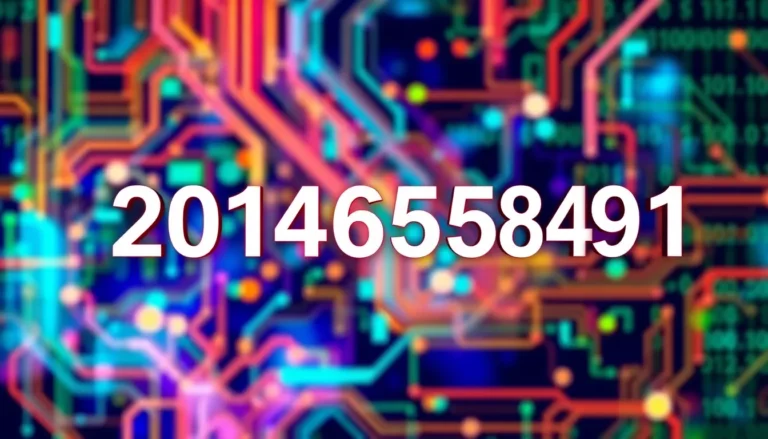In today’s fast-paced digital landscape, IoT cloud computing stands at the forefront of innovation. This powerful combination of the Internet of Things and cloud technology is transforming how devices communicate, share data, and operate seamlessly. As smart devices proliferate, the demand for efficient data storage and processing solutions grows, making IoT cloud computing a game changer for businesses and consumers alike.
By harnessing the scalability and flexibility of cloud infrastructure, organizations can manage vast amounts of data generated by IoT devices in real-time. This not only enhances operational efficiency but also unlocks new opportunities for data-driven insights. As industries embrace this technological evolution, understanding the intricacies of IoT cloud computing becomes essential for staying competitive in an increasingly connected world.
Table of Contents
ToggleOverview of IoT Cloud Computing
IoT cloud computing integrates Internet of Things (IoT) devices with cloud services, enabling seamless communication, data processing, and storage. Organizations leverage cloud platforms to handle the substantial data influx generated by connected devices. This integration allows for real-time data analysis, enhancing decision-making and operational efficiency.
Key components of IoT cloud computing include:
- Data Management: Cloud infrastructure stores and organizes vast amounts of data from IoT devices. This management facilitates easier access and retrieval.
- Scalability: Cloud solutions scale effortlessly according to demand. As organizations expand their IoT networks, cloud resources adjust to accommodate growing data volumes.
- Performance Monitoring: Continuous monitoring of device performance occurs through cloud platforms. Remote troubleshooting and updates enhance device functionality and uptime.
- Security: Cloud providers implement advanced security measures to protect sensitive data. Encryption and access controls safeguard information from unauthorized access.
- Cost Efficiency: Utilizing cloud computing reduces the need for extensive on-premises hardware. Organizations lower operational costs while benefiting from flexible pricing models.
- Collaboration: Cloud computing fosters collaboration among teams by providing centralized access to data and applications. This collaboration accelerates project completion and innovation.
Understanding IoT cloud computing equips businesses to harness the full potential of connected devices. Companies better position themselves to leverage data insights for strategic advantages in an increasingly digital marketplace.
Benefits of IoT Cloud Computing

IoT cloud computing offers numerous benefits that enhance business operations and data management capabilities. Organizations leverage these advantages to optimize resource allocation and boost overall productivity.
Scalability
Scalability enables organizations to adjust their infrastructure based on changing demands. As IoT networks expand, businesses can easily increase cloud resources without significant investment in hardware. This flexibility ensures that organizations can accommodate growing amounts of data and a rising number of connected devices. For example, if a company adds hundreds of new sensors, it can seamlessly scale its cloud storage and processing capabilities to handle the additional data load.
Cost-Effectiveness
Cost-effectiveness outlines how IoT cloud computing minimizes operational expenses by reducing the need for physical infrastructure. By utilizing cloud services, organizations pay only for the resources they consume, eliminating upfront costs and maintenance fees associated with on-premises solutions. According to industry reports, businesses can save up to 30% on IT costs by transitioning to cloud-based IoT platforms. This financial efficiency allows companies to allocate resources to innovation and development while maintaining robust data management solutions.
Challenges in IoT Cloud Computing
IoT cloud computing presents several challenges that organizations must address to leverage its full potential. Key issues include data security and privacy concerns, as well as network reliability.
Data Security and Privacy
Data security and privacy rank among the top concerns in IoT cloud computing. Protecting sensitive information from cyberattacks remains crucial, as data breaches can lead to significant financial losses and reputational damage. IoT devices often transmit data with minimal encryption, increasing vulnerability. Organizations must implement robust encryption protocols and access controls to safeguard data throughout its lifecycle. Compliance with regulations like GDPR and HIPAA also poses challenges, as companies must ensure they meet stringent data protection requirements, which vary by region and industry.
Network Reliability
Network reliability significantly impacts the performance of IoT cloud computing. Connectivity issues can disrupt communication between devices and cloud services, hindering data processing and analysis. IoT applications often depend on real-time data transmission to function effectively, making consistent and reliable networks essential. To address this challenge, organizations must invest in resilient network infrastructure, such as redundant connections and edge computing solutions. These strategies can minimize latency and ensure uninterrupted data flow, enhancing overall system performance and user experience.
Key Players in the IoT Cloud Market
The IoT cloud market comprises various established players and innovative startups, each contributing to the growth and evolution of IoT solutions. Understanding these key players helps organizations identify essential partnerships and technologies for maximizing their IoT cloud strategies.
Major Service Providers
- Amazon Web Services (AWS): AWS offers scalable cloud solutions tailored for IoT connectivity and management. Its IoT services include AWS IoT Core, which facilitates device connectivity, data processing, and application integration. Companies leveraging AWS can benefit from its robust analytics, security features, and extensive global infrastructure.
- Microsoft Azure: Microsoft Azure is another leading player, providing a comprehensive suite of IoT services. Azure IoT Hub enables secure communication between IoT devices and the cloud, while Azure Stream Analytics supports real-time data processing. Microsoft’s focus on artificial intelligence enhances data insights and automates decision-making processes.
- Google Cloud Platform (GCP): GCP offers an expansive set of tools that support IoT applications. With services like Google Cloud IoT Core, users can securely connect and manage their devices. The integration of machine learning services enables organizations to analyze data effectively and gain valuable insights.
- IBM Cloud: IBM Cloud specializes in IoT solutions that emphasize analytics, AI, and machine learning. Its IBM Watson IoT Platform supports device management, real-time data analysis, and integrates with various IBM services for enhanced functionality. Companies focusing on advanced analytics and industry-specific applications find robust offerings in this platform.
- Oracle Cloud: Oracle Cloud provides a suite of IoT cloud services that include data analytics and integration capabilities. Its IoT Cloud Applications facilitate real-time data insights, predictive analytics, and seamless integration with enterprise applications, which are crucial for IoT-driven businesses.
Emerging Startups
- Particle: Particle specializes in providing IoT connectivity solutions with its hardware and software platform. Its focus on simplifying device management and cloud integration makes it an attractive option for startups and small businesses looking to scale their IoT initiatives.
- Samsara: Samsara focuses on IoT solutions for fleet management and industrial operations. Its cloud-based platform allows organizations to monitor assets, track performance, and optimize operations through real-time data analytics. Companies aiming to improve productivity often turn to Samsara for its tailored solutions.
- Arm: Arm offers IoT infrastructure, focusing on semiconductor technology and software for connected devices. Their solutions enhance the security and performance of IoT applications, helping manufacturers integrate connectivity features into their products effectively.
- Ayla Networks: Ayla Networks provides an IoT platform that enables device-to-cloud connectivity and management. The platform supports multiple industries, offering customer engagement tools and analytics capabilities that enhance user experiences and operational efficiency.
- Nodle: Nodle leverages Bluetooth technology to create a decentralized IoT network. Its focus on enabling connectivity without reliance on traditional infrastructures positions it as an innovative player, particularly for businesses seeking cost-effective solutions for device management.
These key players collectively drive the IoT cloud market, offering diverse solutions and opportunities for organizations.
Future Trends in IoT Cloud Computing
Emerging trends in IoT cloud computing reflect advancements that enhance efficiency, security, and functionality. Two pivotal trends shaping the future include deeper integration with artificial intelligence (AI) and the expansion of edge computing.
Integration with AI
AI integration into IoT cloud computing enhances data analysis and decision-making. AI algorithms process vast amounts of real-time data from IoT devices, allowing for predictive analytics. Predictive maintenance minimizes equipment downtime, and automated insights streamline operations. For instance, industries leveraging AI can predict equipment failures before they occur, resulting in reduced maintenance costs by up to 25%. The ability to derive actionable insights boosts operational efficiency, enabling organizations to respond dynamically to market demands and optimize resource allocation effectively.
Edge Computing
Edge computing complements IoT cloud computing by processing data closer to the source. This trend significantly reduces latency and bandwidth use, as devices can analyze data locally instead of sending it to a centralized cloud. By enhancing response times, edge computing proves essential for applications requiring real-time decision-making, such as autonomous vehicles and smart manufacturing. Implementing edge devices decreases latency by up to 50%, increasing system reliability and operational effectiveness. As organizations adopt edge computing, they improve data handling capabilities, ensuring seamless operations while maintaining robust security frameworks against potential threats.
IoT cloud computing is reshaping how organizations interact with technology and data. By harnessing the power of cloud infrastructure, businesses can streamline operations and gain valuable insights from their connected devices.
As the demand for efficient data management grows, adopting IoT cloud solutions becomes essential. The ability to scale resources and reduce costs while enhancing security and performance will drive competitive advantages in the digital marketplace.
With the continuous evolution of IoT technologies and the integration of AI and edge computing, organizations are well-positioned to thrive in this dynamic environment. Embracing these innovations not only addresses current challenges but also prepares businesses for the future of connectivity and data-driven decision-making.



